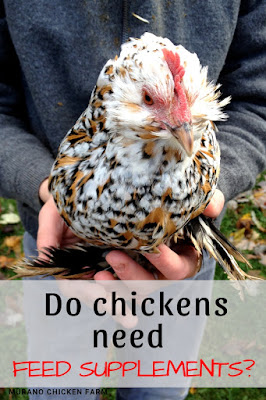Of course they wouldn't still be manufactured if people weren't buying and using them, so somebody is feeding them to their chickens. Should you?
Well, that kind of depends on what your chickens diet regularly looks like. In some very specific conditions, some of these supplements might be good for your chickens. Let's talk about that...
What do chickens eat?
Most of us feed our chickens a commercial layer feed. These are formulated to have a certain % of protein, fat, fiber etc. They also have added vitamins like B-12, folic acid, vitamin E and more. According to Purina: Chickens require 38 unique nutrients each day to start strong, lay strong and stay strong.
A commercial chicken feed product will have all those nutrients in it already! Because these feeds are created to be nutritionally complete, you should never need to feed your chickens additional supplements except oyster shell or grit.
As long as your feeding the proper feed for your chickens type and life stage (chick starter, layer feed, gamebird feed etc) they are getting all the vitamins and minerals they need.
You may need to give your chickens oyster shell if they are producing weak or thin shelled eggs. Oyster shell is used as a calcium supplement for laying hens.
Some hens require more than others, so feeding oyster shell or another calcium supplement free choice is the best way to make sure only the hens that need extra calcium get it.
I clean and feed my chickens eggshells as a cheap but effective substitute for oyster shell.
Grit is only necessary as a supplement if your chickens do not freerange. If they have access to the outside they will naturally pick up small stones and rock chips which act as grit in their gizzard.
This is why not all chickens will need a grit supplement. You could also give them contractors sand or a shovel full of yard dirt to dig through.
Other than a good layer feed, some free choice oyster shell or eggshells and a small dish of grit you should not have to supplement your chickens diet on a daily basis. Buying feed supplements in this case is simply wasting money.
To be clear, I'm not talking about supplementing your chickens feed with mealworms or sunflower seeds during a molt. Or feeding them a piece of a scoby or some yogurt if they aren't feeling well. Or even ACV. I'm talking about these guys in the picture below.
Do chickens need feed supplements?
The feed store is seriously starting to look like the supplement isle at the local drugstore! In fact, we need to start looking at these feed additives as vitamin supplements.
As with humans, if a chickens nutrition is complete, then any excess vitamins and minerals they ingest will just be excreted.
Too much supplementation just creates expensive chicken poop.
You wouldn't walk down the vitamin aisle at the grocery store and just grab bottles of stuff for the whole family to take each day. You would look for an exact vitamin or formulation to fit your need or to fill a deficiency.
In the same way these 'one formula fits all' supplements may not be good for all your chickens. Most of these chicken supplements are unnecessary except for 2 situations.
1) You have a chicken recovering from an illness and want to give her extra nutrition to recover. (I'd probably stick to healthy whole foods though)
2) You make your own feed.
If you look at the ingredients on any chicken feed label you'll see grain or grain products as the first thing. The further down you get on the list you'll start to see vitamins and minerals. If you're blending your own feed from different grains you'll need to add these vitamins also. That is when these supplements are most useful.
Here's an excellent article on making your own feed from Jill at The Prairie Homestead. You'll notice a vitamin and mineral supplement called Poultry Nutri-Balancer on the ingredient list. In this case adding a feed supplement helps fill in the nutritional gaps and makes sure the chickens get what they need to stay healthy.
Many of the chemical supplements pictured above can be replicated with natural foods. You can increase the Omega-3s of your hens eggs by feeding flaxseed.
Brewers yeast is high in B vitamins. Fermenting chicken feed creates probiotics and makes the vitamins, minerals and proteins more bioavailable to them.
Now I suppose if you have a fancy show chicken and need to get him in top shape then a fancy show chicken supplement might be just the thing to make his feathers shine.
Or maybe if you don't feed a commercial feed and prefer to let your chickens live on kitchen scraps and bugs from free ranging, then a supplement would be a good idea to fill in any nutritional holes in the diet.
In your average backyard flock though, a chicken feed supplement is just a waste of money.
Want to know more about raising chickens? Click here for my top posts on chicken keeping!
~L
Want information on raising chickens sent right to your email weekly? Click right here to join my list and get new posts sent directly to you the day they're published ... plus, you'll also get 4 free downloads including '25 Ways to save money raising chickens'.




No comments:
Post a Comment